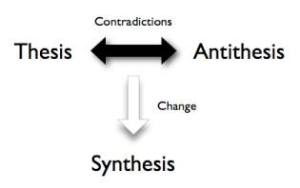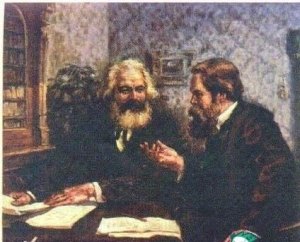“Dialectics” refers to the way of studying how things change in the universe at every level, in a way that takes account of the sheer complexity and interconnectedness of these processes. A sophisticated dialectical understanding of how change occurs in the universe can be found in various different early civilisations: for example Heraclitus developed a dialectical philosophy in Ancient Greece, as did Lao-Tzu (the founder of Taoism) in Ancient China – the Yin/Yang symbol is a classic dialectical representation of the interconnectedness of the universe and the fact that everything consists of opposing forces in balance (or equilibrium) at any one point.
Unfortunately in Western civilisation it appears that this sort of sophisticated dialectical understanding of the way the universe is has been relatively neglected in favour of a much cruder “categorisation”-type approach, where, for want of a better idiom, things are viewed in a very basic “black or white” way. This approach seems to be due to the significant influence of Aristotle (to the exclusion if other thinkers) on the subsequent development of Western philosophy, and in particular to the incorporation of Aristotelian philosophy into the “official” Western Church philosophy by St Thomas Aquinas in the 13th century – creating a hybrid Aristotelian/Bible-based view of the world known as Scholasticism. While this relatively crude and rigid approach was fine (and indeed appropriate) for straightforward mathematical calculations (where 1 is 1 and 0 is 0 and that’s all there is to it!!), it is just not sophisticated enough for studying the universe at a higher level of complexity. So while what became classical Western physics was perfectly capable of explaining the universe at the level of “planets = large billiard balls”-type Newtonian mechanics, it was completely flummoxed by the new discoveries in physics that were occurring around the turn of the 19th/20th century – later explained by the revolutionary approach of Einstein and others, in terms of the theories of relativity and quantum mechanics – examples of dialectical theories par excellence!
Similarly, the basic Linnaean “classification”-type approach to biology was fine if all you were doing was sorting out different species of butterfly, but it couldn’t explain how species develop or change over time. Hence, before Darwin, the origin of species was explained simply by the orthodox Christian view that God had made the world in six days etc etc. Again, Darwin’s theory of evolution was a classic example of a dialectical theory. However, it was the German philosophers Immanuel Kant and later G. W. F. Hegel who “rediscovered” dialectics from a general philosophical point of view.

Later Friedrich Engels – after studying Hegel – was able to distil the whole of dialectical philosophy into 3 general principles, that in fact operate throughout the universe at every level:
1. The principle of the interpenetration of opposites (as we have seen, all things are composed of opposing forces existing in balance: a planet’s gravitational attraction to its nearest star is exactly counterbalanced by its angular momentum, which thus keeps it in constant orbit; protons in an atomic nucleus are repelled away from one another by the fact that they are all positively charged, yet are held together by the intranuclear strong force existing exactly in balance: if the strong force did not exist, the protons would all fly apart; if the charge did not exist (so if the strong force was unopposed), the protons would all collapse into one another!
2. The principle of the transformation of quantity into quality: all things change quantitatively – i.e. slowly, incrementally, imperceptibly – until a change of state occurs, i.e. a turning point, a qualitative change. So when water is heated, it gets hotter and hotter and hotter, until it reaches 100 degrees and it turns to steam. Or a ruling class will clamp down more and more on its people, until finally the day comes when they have had enough and revolt.
3. The principle of the negation of the negation: a better way of phrasing this dialectical principle is to say that change occurs, as it were, “in spirals”: i.e. patterns repeat themselves, though things are never quite the same the second time around; things have moved on and are different in important ways, despite the fact that similar forces are indeed at work and, to an extent, history is repeating itself. So a car wheel will turn full circle, but the car is not in its original starting position; it has moved forward. The Tories might be in government, followed by Labour; followed by the Tories again, but the second Tory government will not be exactly the same as the first – things will have moved on.
For further introductory reading, I strongly recommended the “Dialectics for Kids” website, although do remember that its authors are not Marxists, but American liberals. Still, that does not take away from their explanation of the principles of dialectics, which is excellent.
Friedrich Engels “Socialism: Utopian and Scientific” – Part 2 (I think) is the classic exposition of dialectics and is excellent – and indeed very lucid.
http://melinstitute.org/2014/06/21/study-course-dialectical-and-historical-materialism/

